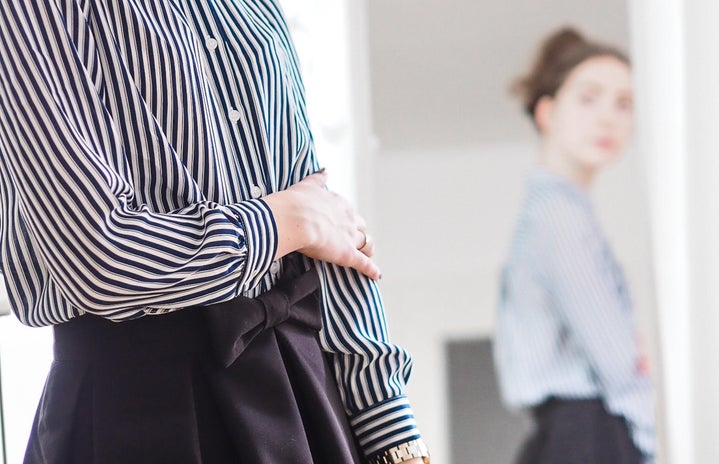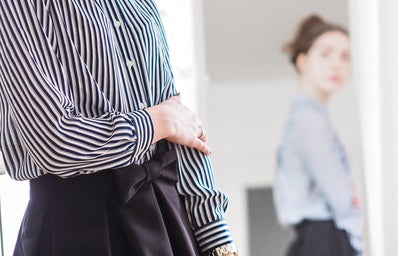*Content Warning: Please be warned this article discusses the experience of an eating disorder*
I can recall many memories of looking into a mirror in my childhood bedroom whilst pinching my plump five-year-old cheeks disappointedly. I would stare at the outline of my three foot tall body, tucking my shirt tightly into my skirt every day. This regimen was done as an attempt to shrink the appearance of my waist, a waist I had realized didn’t look quite as small on my body as Paris Hilton’s or the Bratz Dolls’ in my playroom. When I was in dance class I would place myself right behind the most petite girl on the ballet bar so I could estimate how many inches differed between our thighs. “Can you please stop, we need to go”, my best friend in high school would beg me as I took and deleted the umpteenth photo of myself in the mirror. My mom would come running into the bathroom, “What’s wrong??”, a panicked exclamation after hearing the distressed “fuck!” I had blurted while stepping on the scale. For most of my life, I used every mirror, picture, clothing item, scale, female peer, and reflective surface as a measuring device for my self-worth.
65% of women in the U.S. between the ages of 25 and 45 struggle with disordered eating, and 10% struggle with a clinical eating disorder. This means that 75% of American women have an unhealthy relationship with their bodies. Given these rather bleak odds, it’s not surprising that I’ve been a member of these statistics myself. Last year, I reached one of the darkest points in the battle against my body and entered ED treatment. This is where I was taught about “body checking” or, rather, had learned the term for it.
Put simply, body checking is “the habit of seeking information about your body’s weight, shape, size, or appearance”. As my introduction intended to reveal, I had known body checking exceptionally well and long before I entered my recovery program, but it wasn’t until I was made conscious of it and was advised to stop that I knew anything about how harmful it was.
I had imagined that the day I looked at my image, imperfections and all, and loved what I saw, would be the day I’d find happiness and heal my ED. But, I discovered in treatment that this was far from the truth. The day my image, whether I loved it or hated it, had nothing to do with my mood would be the day I took a huge step towards recovery. This day eventually came, and for me, it came once I stopped body checking, though that was no small feat.
With the support of my parents, we placed sheets and cloths over every body-sized mirror in our house and threw out my weighing scale. But even then, I still had my phone camera. I still had every window I walked past and mirror I’d encounter when out of the house. Boy, it felt like nails on a chalkboard to walk by a tall store window and divert my eyes from the body parts they were used to darting towards.
I wanted to have full awareness of what I looked like. This want determined whether I could feel confident, or needed to criticize myself into restriction. While it was terrifying to let go of this monitoring system, it was most unnerving to realize how often I felt the impulse to use it.
How much time had I been wasting staring at my body? Not only was it a vapid and vain use of time, but it was also highly stressful. Each time I approached the mirror or scale, I held my breath. It was like that feeling when you drop your phone and look at it facing screen-down. It could either be broken and ruin your day or work just fine and allow you to move on. It was magical to realize that after weeks without body checking, no matter what I looked like, I would never be broken. I could walk right past a mirror or unknowingly gain weight, and I’d still carry on with my day the same as any other.
Each time I’d be tempted to glance at my reflection or begin to scrutinize myself, I would repeat a mantra that my nutritionist taught me: “Your body is the least interesting thing about you”, and, as it turned out, she was right. Staring in the mirror at myself had added absolutely nothing stimulating or essential to my life. In the end, I realized that these obsessions only took time and headspace away from the things that actually energize and interest me.
Letting go of body checking forced me to take control of my day. It was no longer up to my image to make me feel confident or insecure, excited or bored. Obsessing about my size and how I could control it had been an escape from my life. I didn’t think that I alone could make myself feel good. I thought I needed the validation of “beauty” to do it for me. Once I got through the initial growing pains, it was freeing. I could actually engage with the fullness of my experiences instead of seeing them through some obscured lens defined by how I assumed people perceived me.
Recovering from an eating disorder or disordered eating is an extremely individualistic process. What works for some individuals may not work for the next. But, if some of these thoughts and habits resonated with you, I encourage you to investigate the ways and reasons you body check. It is extremely prevalent, whether you notice it with friends or scroll past it on Tiktok and Instagram. Although common, this preoccupation with our appearance is not normal or healthy, and, coming from someone who did without checking for months, appearance is truly not that important.
It’s wonderful to appreciate your own aesthetic beauty, but it’s absolutely awful to feel like happiness is non-existent without it. They say nothing tastes as good as being skinny feels but, I know for a fact the people saying that haven’t tasted the freedom of body neutrality.

